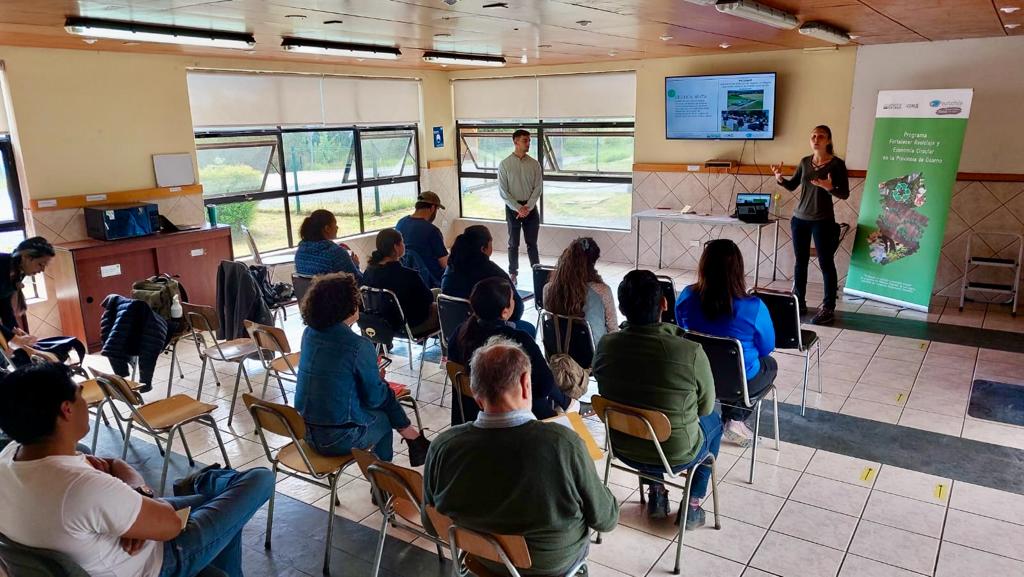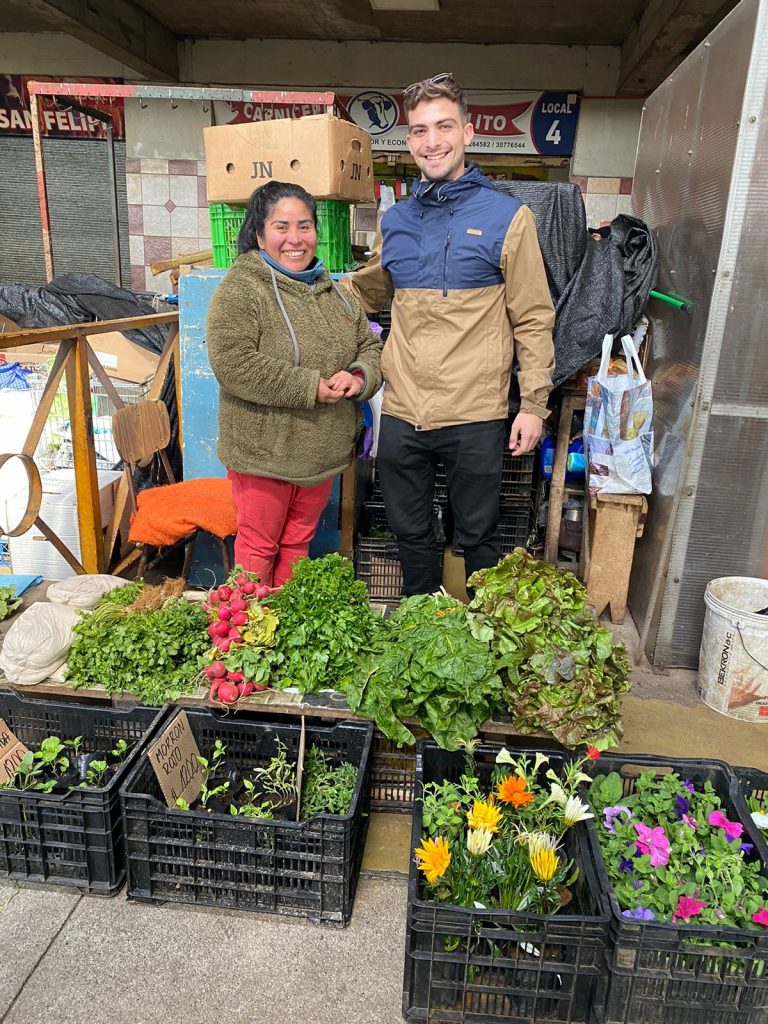Waste Management and Circularity in the Province of Osorno: Eurochile Workshops with the Experience of a European Expert
Ferran Climent, co-founder of RedEcoec and Spanish expert in Circular Economy, participated in the workshops held in Rupanco and Puyehue, in the province of Osorno. During these sessions, he presented various circular modalities and a comprehensive recovery and recycling plan designed for the region, in the framework of the programme “Strengthening Recycling and Circular Economy”.

RedEcoec is a business group whose purpose is to generate a significant impact on the three pillars of sustainability: Economy, Environment and Society. Its main focus is to boost the competitive advantage of companies through the strategic application of the principles of the Circular Economy and Industrial Ecology. This objective is achieved through the establishment of synergetic networks between companies, organisations and public entities, with the aim of minimising waste generation as much as possible.
It also carries out analyses and diagnoses of available resources, enabling it to propose innovative solutions through collaboration between different value chains and sectors. The goal is to transform individual weaknesses into collective strengths, thus promoting a more efficient use of environmental resources and giving rise to the creation of Circular Communities.
In this regard, we had the opportunity to interview Ferran Climent, Spanish expert in Circular Economy and co-founder of RedEcoec, who participated in the workshops held in Puyehue and Rupanco, Osorno, as part of the programme “Strengthening Recycling and Circular Economy in the Province of Osorno”. This programme is financially supported by the Regional Government of Los Lagos through the National Fund for Regional Development (FNDR). Its main objective is to strengthen and improve the associated processes to reduce the negative environmental impact caused by the inadequate management of waste, both organic and inorganic, generated in household and industrial activities in the Province.

On the right, Ferran Climent, Spanish expert in Circular Economy and co-founder of RedEcoec.
What are the current challenges in waste management?
The current challenges we face in the province of Osorno, specifically in the communes where we will carry out the project, Puyehue and Rupanco, are mainly focused on rural isolation and disconnection from the urban population. In order to effectively address the integrated management of the territory, it is essential to establish lines of collaboration with the most remote municipalities, companies and communities. We seek to ensure that management strategies are efficient in terms of both environmental and economic impact, carefully considering the costs associated with waste removal.
What are the waste reduction trends that can be adopted in everyday life?
In terms of citizen participation, there are a number of actions that can be addressed. One of the key problems is organic waste management, and individual composting is a prominent solution, especially for those who have their own land, as this could result in a 50% reduction of waste generated. On the other hand, when considering the category of mixed waste, which includes paper, cardboard, plastic and glass, plastic, in particular, stands out as the main problem and, at the same time, as one of the most easily solvable. This can be achieved by replacing single-use bottles with reusable options. In addition, it is important to note that glass and cardboard present simpler disposal alternatives, either through local recyclers or municipal waste management. The possibility of using and reusing glass or cardboard packaging, as observed in various practices throughout the project, emerges as a viable alternative to plastic consumption and its consequent environmental impact.
What innovative technologies are currently used to regulate both household and industrial waste management?
In relation to organic matter, one of the technologies that can be used is the one that was explained in objective 1 of this project during the workshop: the use of the TUMH compost calculator. Every farmer, producer or person with a composter can use this application to create quality compost from organic materials, both dry structurants and fresh organics. Step by step, using this application, they can see how the fertility of the compost they are going to use improves and how they can improve the properties of the soil in a simple and easy way, educating themselves in the process.
In terms of new technologies that we will address for the agri-food industry in the next workshop, we will present “Food waste for food back”. In this workshop, we are transforming waste, especially from the fruit and vegetable sector, which has a fibre base. We are looking to replace low-quality plastic-derived packaging with this new plant fibre. This new packaging not only addresses the environmental problem, but also the economic problem associated with the purchase and generation of plastic packaging, allowing the reuse of a resource that previously ended up in compost or landfill. This adds value to the packaging of fruit and vegetables destined for consumers.
Another innovative technology proposal comes from Belgium, the company Ecovative, which uses organic matter to grow mushrooms. The edible part of these mushrooms is distributed in the agri-food sector, while the mycelium, the vegetative part, is used in various industries. This includes the packaging sector, where the shape of the object determines the adaptation of the packaging, thus eliminating the use of polypropylene. In addition, these mycelia are used in the cosmetics industry, the production of fibres for new fabrics from plant forms and in the creation of new bio-based materials by loading this organic part of the mycelium.
What are the government policies in Spain related to recycling and waste management?
In Spain, as in all member countries, in response to the European Green Pact, derived from the Economy for the Common Good movement in 2015, which promoted corporate social responsibility of companies, a circular economy is sought to be achieved through three main legislations at European level. At national level, in Spain, these directives have already been transposed, and in our territory, as is the case of the Valencian Community, we already have our own legislation at regional level. We are referring to the areas of waste and contaminated soils for a circular economy, where the aim is, on the one hand, to reduce prices that do not promote the circular economy and, on the other hand, to establish economic funds to encourage companies to take this step, through different articles and lines of financing.
In addition, a new law has been introduced, which did not exist before this new legislative package of the European Green Pact: the law on energy transition and climate change. This law adapts specific measures to each territory according to its climatic characteristics and associated risks, both for public administration and the private sector. It addresses issues such as energy transition to eliminate fossil fuels and promote the use of renewable energies, as well as protection against events such as floods and changes in crops due to temperature increases, among other actions.
Finally, the third most relevant law, approved in the Valencian Community and also in process in Chile, is the law on reinforced social and corporate responsibility. In Spain, specifically in the Valencian Community, to incentivise good business practices with recognition and prizes, between 30% and 40% more points are awarded in public tenders for the administration. This applies if companies carry out environmental and social actions, especially in the field of education. To obtain these benefits, companies must go beyond being merely economic by calculating their carbon footprint, implementing equality plans to promote gender equity and fulfilling other corporate social responsibility requirements.
What Spanish circular practices can be replicated and applied in Chile?
In terms of sustainable practices, we will address two different approaches. On the energy side, we would like to introduce the concept of a local energy community, where the municipality, citizens and businesses work together to establish a renewable energy cooperative. In the case of the Valencian Community, solar panels are the most efficient option due to solar radiation, although sources such as wind or tidal energy can also be considered. This approach involves the creation of a community among the owners of these infrastructures to facilitate the exchange of energy and promote sustainable consumption. This model decentralises energy consumption, reducing dependence on non-renewable sources such as coal, granting energy sovereignty and establishing fair prices based on the useful life of the energy, avoiding market volatility and allowing self-sufficiency for the population.
In the industrial sphere, in the Valencian Community and at the national level in Spain, entities for the management and modernisation of industrial areas are being implemented. In these associations, entrepreneurs collaborate to address energy, raw materials and infrastructure issues with a management entity that acts as a spokesperson for the entrepreneurs before the municipality. This public-private partnership aims to keep the companies, which generate economic wealth for the municipality, satisfied. In this context, industrial symbiosis practices are carried out as part of the management and modernisation of industrial areas. This involves exploring exchanges of waste that can be converted into raw material for other companies, as well as collectively managing common waste between producers to reduce costs and impacts. The possibility of joint purchases of the same raw material to optimise resources is also considered.
After your visit to the Province of Osorno, what challenges do companies face in the short and long term?
After the first few days of field visits, we have been able to draw some conclusions, although further visits are needed. We noted that it is crucial to strengthen collaboration between companies and foster greater mutual understanding in order to reap the benefits inherent in the circular economy, which is based on collaboration. Industrial symbiosis, which involves collaboration and getting to know each other, identifies opportunities to save money and reuse each other’s actions. At the industrial level, especially in more tourist and commercial sectors, it is clear that companies need to come together and work together to manage waste properly, which in turn will contribute to cost reduction. Furthermore, this collaboration will provide a competitive advantage and a differentiator in the face of increasingly conscious consumers, as sustainable practices offer added value when making consumption decisions.
How can Chilean companies be motivated to continue implementing circular measures?
To motivate companies, the first step is to clearly show them the economic return they can achieve, not only in the short term, but also in the medium and long term. These actions, which involve changing the way they work, can offer a more sustainable business journey through new practices. Sustainability, as the word itself suggests, implies maintaining the same activity over a longer period of time. Applying circular economy approaches will enable companies to engage local suppliers without sourcing risk, foster stronger business relationships with local customers and facilitate loyalty. In addition, these practices can help to expand into international markets, differentiate and position themselves with a circular commitment. The Circular Economy should therefore be seen as a strategy, not as a sudden change, but as a transition that will bring long-term benefits.
